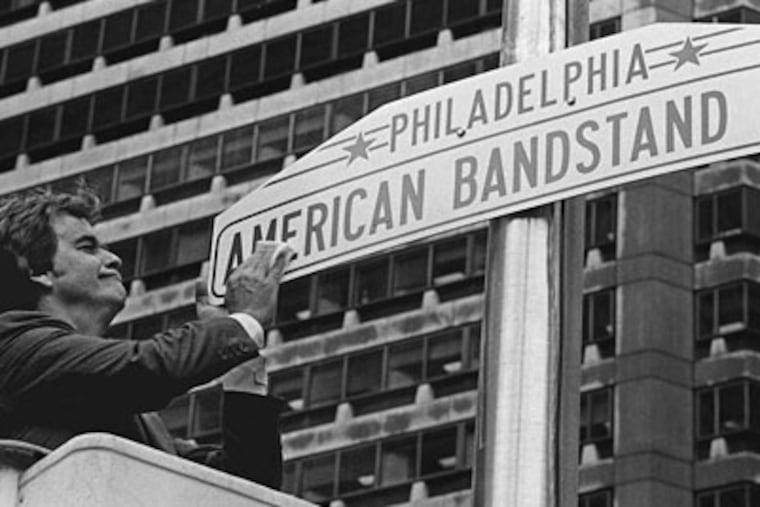Dick Clark wasn’t the retiring type
DICK CLARK might have preserved his image as “America’s Oldest Teenager” if he’d given up “New Year’s Rockin’ Eve” after the 2004 stroke that turned him, seemingly overnight, into an old man. But, then, he wouldn’t have been Dick Clark.

DICK CLARK might have preserved his image as "America's Oldest Teenager" if he'd given up "New Year's Rockin' Eve" after the 2004 stroke that turned him, seemingly overnight, into an old man.
But, then, he wouldn't have been Dick Clark.
A producer and performer who was juggling multiple TV gigs long before his multitasking New Year's Eve co-host, Ryan Seacrest, was born, Clark, who died Wednesday at age 82, simply wasn't the retiring type.
When I met him nearly 10 years ago on the set of NBC's "American Dreams," a show, set in early '60s Philadelphia, about a family whose daughter becomes a dancer on "American Bandstand," Clark was already 72. And though not quite as eerily youthful in person as he still appeared on-screen, he looked pretty good, even by Hollywood standards.
But what surprised me then was that he'd shown up at all.
It was the summer before the show's fall 2002 premiere, and though construction was still under way on the "Philadelphia street" at Sunset Gower Studios, which had a view of the Hollywood sign, the show's creator, Jonathan Prince, had agreed to let me come over to have a look while I was in L.A. Shooting hadn't begun and I'd been warned not to expect much.
I ended up getting a tour of West Coast "Philly" conducted by Prince and Clark himself, followed by an hour-long interview with the two of them in Prince's office, in which it quickly became clear that Clark's executive-producer credit wasn't, as I'd assumed, some honorary title that he'd gotten in return for access to the "Bandstand" archives.
Oh, he let Prince talk for awhile. A former actor who'd gotten his first job — as a runner — from Clark, Prince said that he got the idea to use "Bandstand" on the show because "Dick had always said to me that the kids who danced on 'Bandstand' were television's first reality stars."
Prince then proceeded, somewhat optimistically as it turned out, to outline seven seasons' worth of potential plot lines as Clark sat by, shaking his head and saying, "Don't tell her that."
But when I finally got around to asking why a network that targeted people younger than 50 would want a show set in the 1960s, it was Clark who answered.
"Let me help you with this," he said. "It's cross-generational. Part of it is the music. The music has been ground into our memory banks since we were children. I don't care what generation you come from, you know this music. That's one of the underpinnings.
"The other is, it's all relatable. We're living in a time when all of the sudden, the damn world's changed on us overnight, and we're terrified of what the future brings. Now think of what it was like in 1963: We're not a banana republic and they've killed our president. … You don't blow up two buildings and make them disappear in the blink of an eyelash. It's unheard of."
I was, I realize now, getting a taste of what it must have been like to be pitched to by Dick Clark, who'd been selling TV shows almost as long as there have been TV shows, whose credits listings on the Internet Movie Database scroll on forever and who, despite having all the money anyone would ever need, seems never to have lost the will to keep showing up. n
Contact Ellen Gray at 215-854-5950 or graye@phillynews.comor follow on Twitter @elgray.Read her blog at EllenGray.tv.